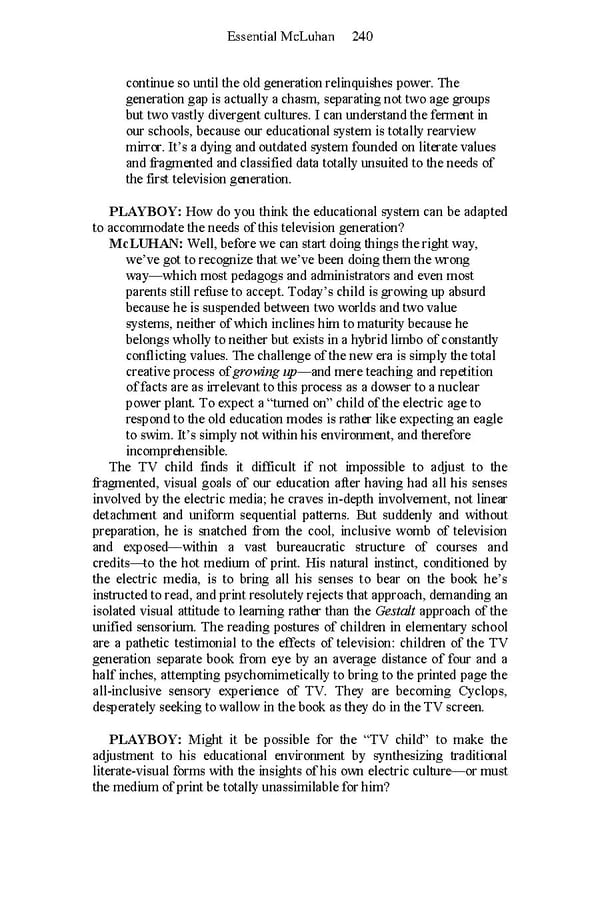Essential McLuhan 240 continue so until the old generation relinquishes power. The generation gap is actually a chasm, separating not two age groups but two vastly divergent cultures. I can understand the ferment in our schools, because our educational system is totally rearview mirror. It’s a dying and outdated system founded on literate values and fragmented and classified data totally unsuited to the needs of the first television generation. PLAYBOY: How do you think the educational system can be adapted to accommodate the needs of this television generation? McLUHAN: Well, before we can start doing things the right way, we’ve got to recognize that we’ve been doing them the wrong way—which most pedagogs and administrators and even most parents still refuse to accept. Today’s child is growing up absurd because he is suspended between two worlds and two value systems, neither of which inclines him to maturity because he belongs wholly to neither but exists in a hybrid limbo of constantly conflicting values. The challenge of the new era is simply the total creative process of growing up—and mere teaching and repetition of facts are as irrelevant to this process as a dowser to a nuclear power plant. To expect a “turned on” child of the electric age to respond to the old education modes is rather like expecting an eagle to swim. It’s simply not within his environment, and therefore incomprehensible. The TV child finds it difficult if not impossible to adjust to the fragmented, visual goals of our education after having had all his senses involved by the electric media; he craves in-depth involvement, not linear detachment and uniform sequential patterns. But suddenly and without preparation, he is snatched from the cool, inclusive womb of television and exposed—within a vast bureaucratic structure of courses and credits—to the hot medium of print. His natural instinct, conditioned by the electric media, is to bring all his senses to bear on the book he’s instructed to read, and print resolutely rejects that approach, demanding an isolated visual attitude to learning rather than the Gestalt approach of the unified sensorium. The reading postures of children in elementary school are a pathetic testimonial to the effects of television: children of the TV generation separate book from eye by an average distance of four and a half inches, attempting psychomimetically to bring to the printed page the all-inclusive sensory experience of TV. They are becoming Cyclops, desperately seeking to wallow in the book as they do in the TV screen. PLAYBOY: Might it be possible for the “TV child” to make the adjustment to his educational environment by synthesizing traditional literate-visual forms with the insights of his own electric culture—or must the medium of print be totally unassimilable for him?
 Essential McLuhan Page 246 Page 248
Essential McLuhan Page 246 Page 248